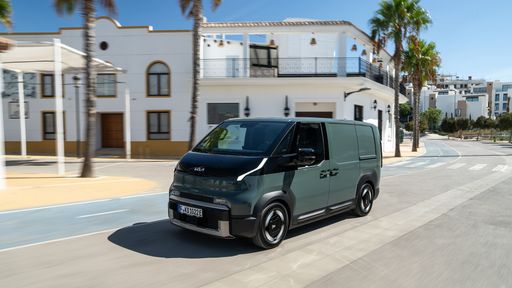VW Transporter Transporter vs Kia PV5 - Differences and prices compared
Compare performance (286 HP vs 163 HP), boot space and price (37500 £ vs 32800 £) at a glance. Find out which car is the better choice for you – VW Transporter Transporter or Kia PV5?
Costs and Efficiency:
Price and efficiency are key factors when choosing a car – and this is often where the real differences emerge.
Kia PV5 has a to a small extent advantage in terms of price – it starts at 32800 £, while the VW Transporter Transporter costs 37500 £. That’s a price difference of around 4695 £.
In terms of energy consumption, the advantage goes to the Kia PV5: with 19 kWh per 100 km, it’s somewhat more efficient than the VW Transporter Transporter with 21.90 kWh. That’s a difference of about 2.90 kWh.
As for range, the Kia PV5 performs clearly perceptible better – achieving up to 416 km, about 85 km more than the VW Transporter Transporter.
Engine and Performance:
Under the bonnet, it becomes clear which model is tuned for sportiness and which one takes the lead when you hit the accelerator.
When it comes to engine power, the VW Transporter Transporter has a clearly edge – offering 286 HP compared to 163 HP. That’s roughly 123 HP more horsepower.
In acceleration from 0 to 100 km/h, the VW Transporter Transporter is clearly quicker – completing the sprint in 7.40 s, while the Kia PV5 takes 10.60 s. That’s about 3.20 s faster.
There’s also a difference in torque: VW Transporter Transporter pulls evident stronger with 415 Nm compared to 250 Nm. That’s about 165 Nm difference.
Space and Everyday Use:
Beyond pure performance, interior space and usability matter most in daily life. This is where you see which car is more practical and versatile.
Both vehicles offer seating for 5 people.
In curb weight, Kia PV5 is minimal lighter – 1860 kg compared to 1872 kg. The difference is around 12 kg.
When it comes to payload, VW Transporter Transporter noticeable takes the win – 1259 kg compared to 790 kg. That’s a difference of about 469 kg.
Who wins the race?
The VW Transporter Transporter proves to be is largely superior and therefore becomes our DriveDuel Champion!
VW Transporter Transporter is the better all-rounder in this comparison.

VW Transporter Transporter
Costs and Consumption
View detailed analysis
Engine and Performance
View detailed analysis
Dimensions and Body
View detailed analysis
VW Transporter Transporter
The VW Transporter is the workhorse of the modern tradesman, blending practical cleverness with a cabin that's actually pleasant to spend a long day in. It may not steal the style spotlight, but its unshowy durability, clever load solutions and easy-to-live-with character make it a sensible pick for businesses and weekend projects alike.
detailsKia PV5
The Kia EV5 is an exciting new entrant in the landscape of electric SUVs, promising a blend of style and innovation that captures attention. It boasts a sleek and modern design that aligns with Kia's evolving aesthetic identity, blending practicality with eye-catching details. With its foray into the electric vehicle segment, the EV5 is set to offer a highly competitive option for those looking to embrace sustainable mobility without compromising on comfort or tech features.
details




|
|
|
|
|
Costs and Consumption |
|
|---|---|
|
Price
37500 - 60800 £
|
Price
32800 - 38900 £
|
|
Consumption L/100km
7.1 - 8.4 L
|
Consumption L/100km
-
|
|
Consumption kWh/100km
21.9 - 24.4 kWh
|
Consumption kWh/100km
19 - 19.3 kWh
|
|
Electric Range
56 - 331 km
|
Electric Range
295 - 416 km
|
|
Battery Capacity
11.8 - 63.8 kWh
|
Battery Capacity
-
|
|
co2
0 - 220 g/km
|
co2
0 g/km
|
|
Fuel tank capacity
55 L
|
Fuel tank capacity
-
|
Dimensions and Body |
|
|---|---|
|
Body Type
Cargo Van
|
Body Type
Cargo Van, Bus
|
|
Seats
2 - 5
|
Seats
2 - 5
|
|
Doors
4 - 5
|
Doors
-
|
|
Curb weight
1872 - 2462 kg
|
Curb weight
1860 - 2145 kg
|
|
Trunk capacity
-
|
Trunk capacity
1330 L
|
|
Length
5050 - 5450 mm
|
Length
-
|
|
Width
2032 mm
|
Width
1895 mm
|
|
Height
1966 - 1985 mm
|
Height
-
|
|
Max trunk capacity
-
|
Max trunk capacity
-
|
|
Payload
755 - 1259 kg
|
Payload
455 - 790 kg
|
Engine and Performance |
|
|---|---|
|
Engine Type
Diesel, Plugin Hybrid, Electric
|
Engine Type
Electric
|
|
Transmission
Manuel, Automatic
|
Transmission
Automatic
|
|
Transmission Detail
Manual Gearbox, Automatic Gearbox
|
Transmission Detail
Reduction Gearbox
|
|
Drive Type
Front-Wheel Drive, All-Wheel Drive, Rear-Wheel Drive
|
Drive Type
Front-Wheel Drive
|
|
Power HP
110 - 286 HP
|
Power HP
121 - 163 HP
|
|
Acceleration 0-100km/h
7.4 - 16.9 s
|
Acceleration 0-100km/h
10.6 - 16.2 s
|
|
Max Speed
112 - 150 km/h
|
Max Speed
-
|
|
Torque
310 - 415 Nm
|
Torque
250 Nm
|
|
Number of Cylinders
4
|
Number of Cylinders
-
|
|
Power kW
81 - 210 kW
|
Power kW
89 - 120 kW
|
|
Engine capacity
1996 - 2488 cm3
|
Engine capacity
-
|
General |
|
|---|---|
|
Model Year
2025
|
Model Year
2025
|
|
CO2 Efficiency Class
G, A
|
CO2 Efficiency Class
A
|
|
Brand
VW
|
Brand
Kia
|
What drivetrain options does the VW Transporter Transporter have?
The VW Transporter Transporter is offered with Front-Wheel Drive, All-Wheel Drive or Rear-Wheel Drive.
The prices and data displayed are estimates based on German list prices and may vary by country. This information is not legally binding.
